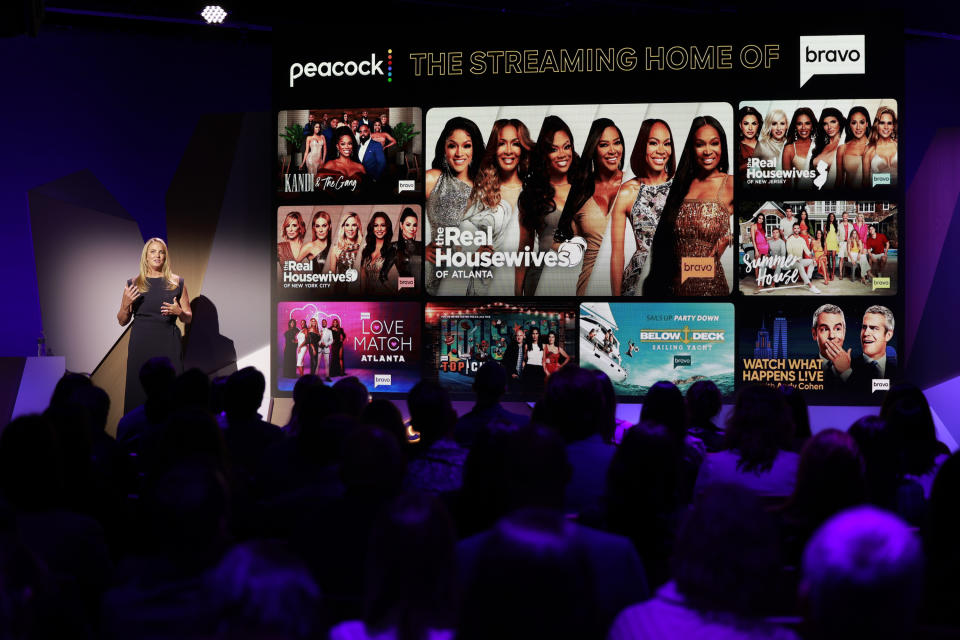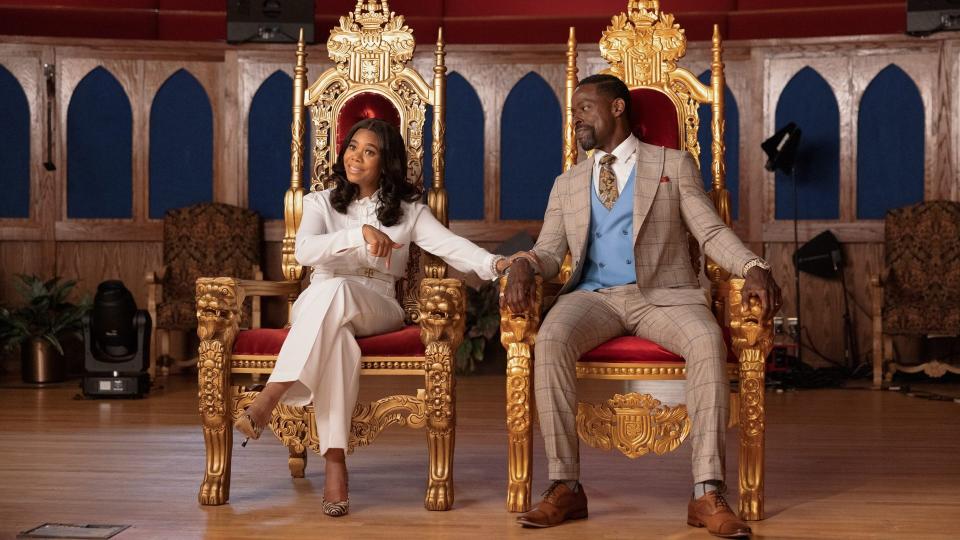Peacock President Kelly Campbell On Reclaiming Next-Day Premieres From Hulu, Doubling Content Spend And Spurring “Next Evolution Of Growth”
- Oops!Something went wrong.Please try again later.

EXCLUSIVE: Kelly Campbell has been president of Peacock for less than a year, but she has already steered the 2-year-old outlet through a series of challenges as NBCUniversal looks to make its mark in the streaming race.
She helmed a high-stakes Olympics pivot from poorly received Tokyo coverage last summer to a more fully committed, wall-to-wall outing at the Beijing Winter Games. She leveraged Super Bowl LVII to help Bel-Air become Peacock’s first original series breakout. On a broader level, she has led a strategic turn from the platform’s original focus on its free, ad-supported offerings toward boosting premium subscriber levels.
More from Deadline
Campbell’s new mission is to guide Peacock’s 27 million monthly active accounts and 13 million paying subscribers toward next-day streams of NBC and Bravo shows after years of them being found on Hulu. Rights to current and library titles, including attention-getters like Saturday Night Live and Dick Wolf’s Chicago franchise, were reclaimed despite parent company Comcast still having a financial stake in Hulu through 2024. (A swath of Bravo titles first made the jump last spring.) Campbell knows the other end of the relationship, having arrived at Peacock in October 2021 after a stint at Hulu, where she was chief marketing officer and president. Prior to her streaming days, she spent a decade as a Google exec after starting out as a banker at JPMorgan Chase.
In a wide-ranging interview with Deadline, the corporate outlook for Hulu and the multibillion-dollar tussle between Comcast and Disney were taken off the table, with Campbell’s camp deferring to colleagues in Philadelphia. Apart from that, the exec was game to tackle a number of topics, from experimenting with movie release windows to bigger bets on live sports to the task of regaining subscriber momentum after a stall-out in the spring. The following are edited excerpts from the conversation.
DEADLINE: After gaining about 4 million subscribers in the first quarter, Peacock was flat in the second quarter, and the number of monthly active accounts actually declined slightly, to 27 million. What subscriber trends are you seeing so far in the current quarter, and what is the outlook for the rest of the year?
CAMPBELL: We had a really strong Q1, and we knew that Q2 we were going to be going into a softer quarter. That was a combination of factors. Obviously, we’re all still kind of getting our content cadence back on track after some of the unknowns with Covid. But we also knew that when you’re bringing in four, four-and-a-half million paid subscribers in one quarter alone, you’ve got to be laser-focused in that next quarter on getting people through that first couple of billing cycles. So, that’s why we decided to really double down on driving and engagement and retention in Q2. We were successful in achieving our goals for Q2. We saw really strong, better-than-expected retention rates from the cohorts that came in through those big events — the Super Bowl and Marry Me with Jennifer Lopez [a day-and-date Universal film release] and, of course, Bel-Air.

Universal
Now, as we’re in the summer heading into the fall, we’re really about to pick that trajectory back up. We’re already seeing it, to answer your question. We are feeling really good about the trends that we’re seeing in our subscriber trajectory right now, both from a paid subscriber perspective and bringing subscribers in and also as we continue to engage our bundled subscribers and our free subscribers.
So, we’re seeing positive trends in all three fronts and our lineup for the fall is tremendous. In addition to next-day content coming exclusively from NBC and Bravo to Peacock, we’ve got Jurassic World Dominion launching Labor Day weekend. Our pay-1 films are performing incredibly well. That one’s obviously huge [with nearly $1 billion in global box office]. We’ll have Minions: The Rise of Gru coming later this year, another big film that we expect to be really powerful for Peacock. In sports, we’re already the home of WWE and the Premier League. More than a million accounts watched the Premier League’s opening weekend this month. We saw really strong retention, too, for people who came in for Premier League last season and then stayed in between seasons. So, that’s a good indicator.
We obviously announced Big Ten [NBCU was one of several companies with a piece of a mutli-year, $8 billion rights deal, including exclusive streaming windows], so we’ve also got big things coming later in the pipe. Sunday Night Football starts September 8. So between our big films, our big sporting events, we’ve got big originals lunching. We’ve got Vampire Academy launching, A Friend of the Family. As we move towards bringing our content exclusively next day to Peacock, we’ll be putting some special subscription offers in the market to help ease that transition for consumers.
DEADLINE: With Hulu and the next-day transition, what have you learned from the Bravo titles that shifted over last spring? Are there any stragglers who didn’t quite understand where their shows went?
CAMPBELL: Bravo’s been great. We’ve grown the number of Bravo viewers on Peacock by about 20%. Obviously, there’s more to come, but it’s been largely successful for Peacock and for Bravo overall in growing the audience.
DEADLINE: How do you approach the task of redirecting folks? It seems like a delicate but important process. Viewers have been used to a certain consumer experience and now you’re telling them it’s all changing.

alvatore DeMaio Jr/NBCUniversal
CAMPBELL: Yeah. It’s interesting. I’ve been thinking a lot about this because if you go back in time to when streaming kind of first came to the market, it was all about making it easier for consumers, giving consumers more choice, more flexibility, and it’s gotten more complicated. This is the type of thing where in my position we’re constantly thinking about how we put the consumer first. How we go back to making streaming a good thing for the consumer, making it easier for the consumer.
People have their habits. We are doing everything we can to ease that transition. Some of that is more subtle around messaging and what we’re communicating directly to consumers. But we’re also going to be offering consumers the opportunity to sign up for $1.99 a month, or 20 bucks for the year. We want to try and take friction out of the system as much as possible.
DEADLINE: The leadership of Comcast and NBCUniversal when Peacock launched in 2020 believed that the pay-TV ecosystem would be a strong foundation for it. You had Comcast Cable and Xfinity, of course, and deals with other operators have been made. As you look at it, how important are pay-TV operators to the growth of Peacock? Historically, they have been key business partners, but in streaming there are so many other ways to find audiences and subscribers.
CAMPBELL: There are a couple ways to think about it. One of the things that got me really excited about Peacock in the first place was to look at how it was launched, and how quickly Peacock has scaled in the market in just two years. When you look at how we were able to scale that quickly, Peacock was really launched off the best of Comcast, right. So I always think about it as we built the technology on the basis of Now TV. We were going to leverage some of the technology from Sky within the Comcast portfolio. We were able to pull in some of the greatest entertainment content from NBC, and on top of that, we were able to get scale through distribution with Xfinity.
Now, two years in, as we look at the value that we’re creating for consumers and start to look at moving more towards driving premium subscriptions, we are working with our partners at Xfinity to migrate those relationships into direct paying relationships with Peacock. It’s a tweak or a change, but it doesn’t take away from just how deep the partnership is with our Xfinity team. Obviously, Amazon and Roku, Apple, Google are all really important partners to us, and we’re having really interesting broader partnership conversations at the company level just as we look to the next year or two and how we show up with consumers, how we scale. But we’re doing that in a thoughtful way.
DEADLINE: Sports is arguably bigger on Peacock than it is for any of your streaming rivals. Because you also simulcast major NBC telecasts like Sunday Night Football, what kind of promotional opportunities does that give you?
CAMPBELL: We are coordinated at the company level. I’m sure you’ve heard about Symphony. So for something like Sunday Night Football we’re really coordinated in how we’re using our promo inventory across linear and Peacock. But we do have different slices of that promo inventory that are controlled by the linear team versus the Peacock team. Again, we sit in a room and map it all out and have a plan together, but knowing that we have a different consumer watching on linear versus on streaming, we’ll use that promo time differently within linear and within streaming. So, some of it is consistent across and then there are pieces of it that we program differently.
DEADLINE: Earlier this year, your colleagues at Comcast said investment in content on Peacock would double to $3 billion this year from $1.5 billion in 2021, rising to $5 billion in the coming years. How does that translate in terms of original titles you will premiere — is there a ballpark number of what you’re expecting?
CAMPBELL: We’re really starting to look at it less through a volume lens and more through a quality and targeting lens so that we can say, ‘OK, how many big tentpole dramas in the original space do we intend to launch, with what cadence, in ’23 and ’24? What is the content that we need to engage this critical cohort?’
So, we have this big cohort that came in for this series or for this sporting event or for this pay-1 film. Now, what content do we need to keep engaging that audience and make sure that we’re providing the right sort of content diet to that audience to keep them coming back because not only do we need to convince the consumer to open their wallet and pay us every month, but we also need them to sit down and open the app to watch. So, we’re constantly thinking about what’s going to hook hook someone to come in but what’s going to continue to keep them engaged. That’s where our data and then our marketing capabilities become so important.

Peacock
This fall, we do have a number of big tentpole originals coming that we are investing more in from a marketing perspective. I think then we have a healthier cadence or originals this fall that have big campaigns than we’ve had in the first couple of years of Peacock’s existence. So, when you look at what’s coming, some of the big ones that I would call out are Vampire Academy and Friend of the Family. We have Bumper in Berlin, from the Pitch Perfect franchise. We have The Best Man: The Final Chapters.
The Resort is in the market now. That was a big original series that we launched a month back. Love Island is performing incredibly well for us as a Peacock original series. That also has really nice overlap with our Bravo cohort, so that’s a good example of like in May when we announced Bravo next-day, we started getting really great traction both bringing people in for the Bravo content and engaging our subscribers with it.
Then we launched Love Island USA as a Peacock original, and we’re seeing again people are coming in for Love Island and then they’re staying for Bravo content. People who came in for Bravo are also watching Love Island USA. That’s where you really start to see that cycle that’s good for consumers and also good for Peacock.
DEADLINE: Let’s talk about how film fits into the larger equation. Some of your contemporaries running other streaming services aren’t sold on making movies purely for streaming. David Zaslav, CEO of Warner Bros Discovery, has shed several of the ones set up at HBO Max, for example. But Peacock seems to be a bit more open to different scenarios.
CAMPBELL: Film is very meaningful and I’m very bullish on the film opportunity overall. The pay-one deal with Universal (under which films move to Peacock as their first post-theatrical stop) really just kicked into gear this year. So when you think about we have two years of Peacock existing and two years of data from Peacock overall but we really only have seven months or so of data from having this pay-one partnership, and it’s performing well. The Black Phone is off to a tremendous start, bringing subscribers in, engaging subscribers, Bad Guys, Downton Abby, Ambulance, The Northman. These films are performing incredibly well for Universal and NBCU and incredibly well for Peacock, which is the ideal situation.
We’re going to continue to invest here. I think it’s a really exciting time to be myself and [Universal film chief Donna Langley] to be able to be in there sort of looking at how we want to approach film at a time like now because there’s a lot to learn. The door is open to get really sort of creative in how we bring film to consumers. The Universal team have been incredibly great partners to us as we think about both acquiring films and bringing them to Peacock from other studios. Meet Cute with Pete Davidson and Kaley Cuoco is a great example.

Focus Features
You’re going to continue to see us be strategic and thoughtful about windowing. It’s not like a set formula, with this many days exactly for every film. I think we sit down and we look strategically at what’s coming to theaters when, what Peacock’s schedule looks like, what else are consumers going to have access to in a certain timeframe. That’s a big consideration in how we decide to launch films. We have more day-and-date films coming, those films have performed incredibly well for us. Halloween Ends is coming in mid-October. Honk for Jesus. Save Your Soul is such a special film. I love this film. It’s coming out September 2, with Regina Hall and Sterling K. Brown. That’ll be day-and-date as well. I think this is another example of where Peacock is in such a great position in the market as part of NBCU because we have that partnership where we can be creative. We can be thoughtful. We can look at dates that work from an overall business perspective at the NBC Universal level but also work for consumer and Peacock perspectives.
DEADLINE: Earlier this summer, NBCUniversal said Peacock has officially become a billion-dollar advertising business, based on this year’s upfront results. Can I ask about the ad experience in general? What’s your assessment of it and how do you want it to evolve?
CAMPBELL: I think that it is going to grow tremendously over the next couple of years. Peacock’s advertising product is arguably the most premium in the market, when you look at the experience that we provide to our advertising partners and how ads show up in the consumer experience both from a basics perspective around ad loads and such and also from an ad innovation perspective. Then when you look at the advertising partners, I think we’re the farthest along when it comes to really providing transparency on data, how we use the data, how we use it for targeting and how we work with our partners to show the returns on their investment.
DEADLINE: Peacock has a different look and feel compared to where it started in 2020. Do you have confidence you’ll get it where you want it to go?
CAMPBELL: Sometimes I feel like I just want to lay out a roadmap and show everyone what’s coming more clearly from a product content and advertising perspective because it feels like, yes, it’s been two years, so I think sometimes people are wondering, ‘What do you have to show for it? Where’s your growth? Why are you only at 13 million subs?’ It’s like, well, it’s actually 30 million when you include monthly actives, which is a really high bar and that’s 60 million individual users. We’re just being really pure in how we build the subscriber base because this is not like a short-term flash in the pan, let’s-get-as-many-subs-as-we-can. This is a true business that we’re building for the long-term. This is a strategic long-term play. There’s so much coming, but I think Peacock and NBC have just been so smart about getting everything right, building the right foundation and building blocks.
I get excited because I think advertising is such a good example of this. I’ve been in the market as a marketer, as a buyer. I understand the different ad products out there pretty well. I will say this advertising product and experience and team are best in class and will absolutely shape the future of what advertising looks like in streaming and direct to consumer.
DEADLINE: Now that everyone is looking to introduce ads, I will say for what it’s worth that in my experience Peacock does ads about as smoothly as I’ve seen.
CAMPBELL: I’m glad that that’s your experience. I’m a very “come in, put your head down, get things figured out” person. Do we have the right product roadmap? Do we have our content filters? There’s been a lot of work to say, “OK, Peacock got to this mark of where we are far faster than I think anyone imagined.” So when I came in, it’s like, OK, now we got here faster than expected. How do we pivot far faster than expected on this premium trajectory? So that takes time to dig in on that. There’s so much detail in sort of building the blocks to set us up for success to now, which is really this fall, like turn that corner. Focus on premium. You have to have the right content, which we do, especially when you talk about content broadly, plus sports and film.
You have to have the right product experience. You have to take consumers with you, which is where things like these offers come into play. You have to have the right advertising experience. So, it’s like we have it all. Now I feel like we have the team in place for this next evolution of growth and scale. We have the building blocks in place for it, but we have to get out there more and be telling our story and talking about it. That’s true for consumers. It’s true for the entertainment industry and Hollywood. It’s true for advertising partners and sort of business and analyst communities. So, I think that this is kind of the beginning of what will be a much more sort of visible and proactive narrative for Peacock out in the market certainly this fall and really into 2023.
DEADLINE: The company hasn’t updated its forecast from 2020 of reaching 30 million to 35 million monthly active accounts by 2025. You’re well on your way to that number. But will you issue a projection to investors for the number of premium subscribers, now that that number is so critical to the strategy? Surely, you have internal targets.
CAMPBELL: We have very ambitious targets that we are extremely focused on. How explicitly we share those targets is a double-edge sword. There’s part of me that wants to shout from the rooftops what our targets are so that people see just how ambitious we are. If you look at our announcements, I’m like, “How do I get people to start to realize The Continental [a limited series project with Lionsgate connected with the John Wick franchise] is a big, big swing?” It’s a big investment. I have complete conviction that it’s the right investment. The Big Ten, I mean that’s a massive, long-term deal with a significant investment, sets Peacock up as the only streamer with exclusive games. These are really big swings that we’re taking that I guess it’s like we just need to keep…it’s like show, not tell is kind of what we’re doing right now. I do wonder when that point is where we just sort of tell more explicitly. But then the minute you do that, you kind of start managing to these short-term expectations. We’re building for the long term. We’re very focused on bringing in not just subscribers to show big numbers but actually bringing people in who are going to come and pay or come and open the app and watch and stay. So, that means we don’t want to be managing to like, “Oh shoot, we need a million more subscribers by next quarter or we’re going to miss expectations,” right? We want to be able to say, “Oh, but actually if we do this that’ll drive 3 million in the following quarter, but we might be short.” It’s like Q2 of this year. I mean there are ways you can instrument to change when the cadence of when you bring subscribers in. But the smart thing to do was say we just added more than 4 million paid subs, which we were 9 million at the start of the year. So, we just grew by 50% in like a month. Let’s focus on keeping those subscribers before we turn our heads back to go grab, grab, grab. So yes, it’s land-grab mentality in our market right now but this is not like this flash-in-the-pan business. This is our future.
DEADLINE: Also, the marketplace has definitely started scrutinizing the numbers more in streaming. As Netflix and other companies have shown, Wall Street is looking at profitability and retention and monetization and ARPU, as opposed to just subscriber growth.
CAMPBELL: People are starting to dig into what is a subscriber versus a subscription. Have they ever opened the product? Have they actually set up an account? Have they actually engaged with the product? I will tell you, our 13 million paid subscribers, those are as pure as they come. It’s a very different bar than what other streamers are reporting on. The other 14 million or so through free and bundled, when we say monthly active that means that they are engaged and active on a monthly basis. Again, a very pure, high bar. So, I think as we shift towards premium, I think it will become maybe more straightforward in how we tell our story and really get the Peacock narrative crisper and better understood with all the different groups we kind of talked about. I’m really excited for that because I think all of the work that we’ve been putting in sort of the first couple years, and especially this past six months or so, we will start to see over the course of this fall and into next year how that all pays off.
Best of Deadline
Venice Golden Lion Winners : Photos Of The Festival’s Top Films Through The Years
'Meet Cute' Photo Gallery: Kaley Cuoco And Pete Davidson Star In Comedy About Falling In Love
Sign up for Deadline's Newsletter. For the latest news, follow us on Facebook, Twitter, and Instagram.

